[Editor's Note]
Korea-Japan relations have been strained for the past 3 years as the feelings of fatigue between the two citizens has been steadily increasing due to the Korean Supreme Court’s ruling on the forced wartime labor in October 2018. Bilateral cooperation to reorganize the world order after COVID-19 also remains bleak. The East Asia Institue (EAI, President Yul Sohn) and Genron NPO (President Yasushi Kudo) conducted the “9th Joint Korea-Japan Public Opinion Poll.” Based on the results of the survey, this issue briefing examines the differences in public opinion between the two countries on security and economic cooperation. This briefing also analyzes the Korean public’s call to improve ROK-Japan relations and increase cooperation. President Sohn argues that ROK-Japan relations should be re-examined under the intensified U.S.-China strategic competition and the possible post-pandemic global risks. He also states that Japan should abandon its one-track approach and understand the Korean’s preference for “future-oriented” cooperation. Additionally, the next Korean administration should respond to public opinion and strive towards the reconstruction of ROK-Japan relations.
On September 28. 2021 the East Asia Institute (EAI) and Genron NPO released the results of the 9th Korea-Japan Joint Public Opinion Poll. The most notable result of this survey was the increased call made by the public for the improvement of Korea-Japan relations and their close cooperation. Since the ROK Supreme Court ruling on the wartime forced labor in October 2018, the public’s feeling of fatigue regarding a strained bilateral relationship has grown. As the relations between the two governments have come to a standstill, the two countries have been faced with considerable economic and strategic costs. Bilateral trade and investments have decreased, coordination and cooperation over the North Korean nuclear issues are difficult, and mutual distancing and slander have reduced diplomatic influence of the two states at the international stage. Currently, it is difficult to conceive of bilateral cooperation in the areas of the COVID-19 preventive measures, securing vaccines, and preparing for the post-COVID-19 world order.
This trend might change. In Japan, a political change took place when Prime Minister Abe, who had been at the center of the anti-Korean sentiment for the past year, was replaced by Prime Minister Suga and on September 29, by Prime Minister Kishida. With events such as the upcoming Korean Presidential election in Korea, the two countries are facing a fluid political situation. Now, citizens of both countries are sending signals for mutual cooperation whilst criticizing the government’s sluggish efforts to improve bilateral relations.
The results of this year’s survey demonstrate that the impression of the other country has improved along with the increased demand for the recovery of the bilateral relationship. The demand was stronger on the Korean side than on the Japanese side. This change should be understood in the context of the perceived change in the external environment, rather than of the internal dynamic of bilateral relations such as the progress in the negotiations of pending bilateral issues. Based on the recent public opinion surveys, I argue that the increasing demand for improved ROK-Japan relations, particularly on the Korean side, are brought on by the intensifying U.S.-China strategic competition and the rising concern over the China challenge. Under a perceived threat from China, the Korean public demands an improved ROK-Japan relationship cooperating through various channels including the U.S.-ROK-Japan trilateral security cooperation. But, the reaction from Japanese public is different, supporting the government policy line that keeps distancing from Korea and uses the existing strategic initiatives including the QUAD, the Free and Open Indo-Pacific Vision(FOIP), and the Comprehensive and Progressive Agreement for Trans-Pacific Partnership(CPTPP).
The survey results pose two challenges to Korea. The first is the gap between the public and the government. Solutions need to be made on how to reduce the state of decoupling between the government and the public’s position on improving ROK-Japan relations and ROK-Japan cooperation (specifically, ROK-U.S.-Japan security cooperation, Quad cooperation, solution to the forced labor issues, etc.). The second challenge is the gap between the Korean public and the Japanese public. How to narrow the gap between the lukewarm Japanese public opinion on improving bilateral relations needs to be addressed. The aforementioned challenges are tasks that the next Korean President needs to take on.
1. The Korean Public Appraises “Future-Oriented Cooperation”
As shown in Figure 1, the “negative” Japanese public opinion toward Korea was expressed in the June 2019 survey. The negative perception of 49.9% reflects the Japanese government’s full-fledged campaign charging that the South Korean Supreme Court’s ruling in October 2018 on the wartime forced labor was a violation of the postwar international legal order. On the other hand, The negative perception of Japan in the Korean public which reached 71.6% was clearly expressed in the July 2020 survey, reflecting events such as, but not limited to, the Abe administration’s export control over chemical materials used for semiconductor production in South Korea, and security conflicts over the end of GSOMIA. It is interesting to note that this trend reveals the different perceptions of the Korea-Japan conflict between the two countries. While the Japanese public has expressed dissatisfaction and anger with the Korean government’s handling of the Supreme Court, the Korean public has displayed similar sentiments toward the Japanese government’s retaliatory measure. The public opinion of the two countries is in line with the stance of each government.
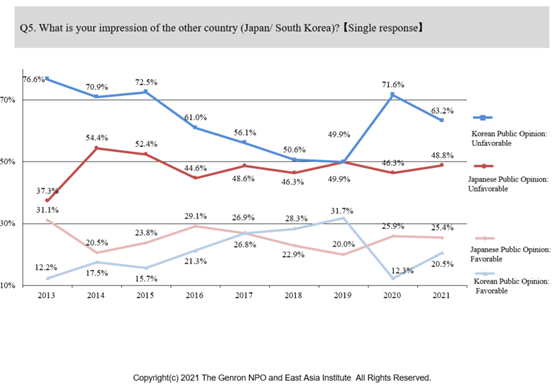
The dissatisfaction and anger of the public in the two countries decreased in a year. Japan witnessed a 5.9% increase in favorability and a 3.6% decrease in unfavorability in 2020, while South Korea noticed an 8.2% increase in favorability and an 8.4 decrease in unfavorability in 2021. The favorable impression of Japan increased from the lowest 12.3% in 2020 to 20.5% and the negative impression decreased from 71.6 percent in 2020 to 63.2%.
However, the negative perception of Korea in Japan increased slightly compared to the previous year, and the favorable impression decreased. Although the Japanese public’s favorable view towards Korea continued to decline from 2016 to 2019 (29.1%→26.9%→22.9%→20%), from 2020, there was a 5.9% rebound in favorability which was maintained to the current year. The unfavorable impression has also maintained a somewhat downwards trend. If this trend persists, we can confirm the bottom rock for the worsening of relations and the downward inelasticity of both countries.
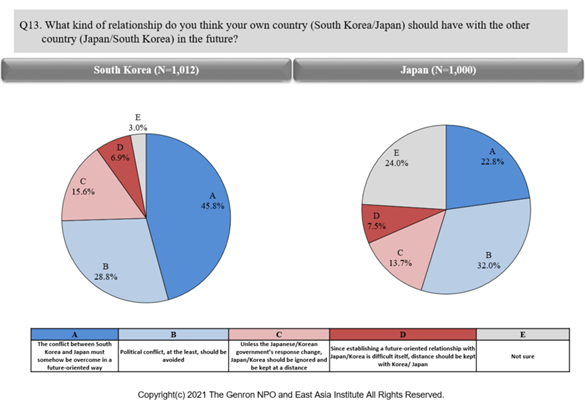
The call for the improvement of ROK-Japan relations following the increased favorable perception of Japan is a natural and expected result. As shown in Figure 2, Korea has strongly expressed the need to improve relations that have continuously deteriorated due to history problems, trade conflicts and controversy over GSOMIA. 45.8% of Korean respondents expressed that conflicts should be overcome in a “future-oriented” way and 28.8% have expressed that at the least, political confrontation should be avoided. Therefore, an overwhelming majority of 74.6% recognize that the current status of confrontation should be avoided. In the case of Japan, 54.8% of the respondents, more than half, support this.
The support for overcoming conflict through a “future-oriented” way can also be found in the public opinion regarding the history problem, one of the main causes of the deteriorating bilateral relations. In Figure 3, compared to the previous year of 24.5%, there was an increase of about 14% in which 38.1% of Korean respondents believed that “as future-oriented cooperation (security, economy, health, climate change, etc.) between the two countries is facilitated, the historical dispute will also be gradually resolved.” The sharp decrease from 43.6% to 21.7% in the view that “no matter the state of cooperation and relations, the history dispute will not be resolved” shows that Korean citizens have a significant focus on “future-oriented cooperation.” Similarly, only 32.6% support the government’s current solution to the conflict regarding the Supreme Court’s ruling on forced labor. The prevailing opinion is that various alternatives should be sought (Figure 4).
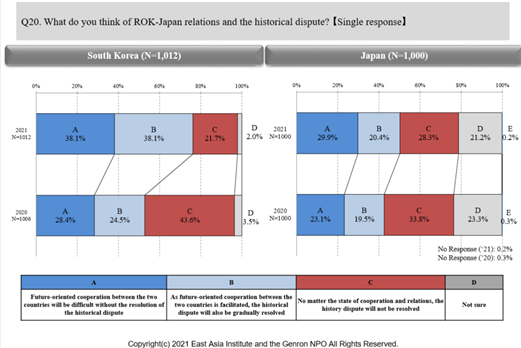
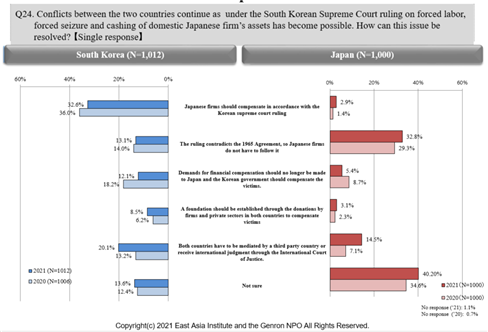
2. Anxiety about the Future leads to ROK-Japan Cooperation
What is the future envisioned by people who support “future-oriented cooperation”? Does it simply mean that “steps towards the future should be made without clinging to the past such as history issues?” The clue to this answer can be found in the changes in Korean public perception of security and economic issues. On the public opinion regarding “economically important countries,” the U.S. (74% in 2020 to 86.7% in 2021) and Japan (41.7% to 52.4%) increased by 12.7%p and 9.7%p respectively, compared to the previous year. Oh the other hand, China remained relatively the same from 78.7% to 80.4% (Figure 5). This trend is surprising, considering the fact that during the COVID-19 pandemic, China recorded positive growth and widened its gap with the U.S. Meanwhile, on the public opinion on “countries that are perceived as a military threat,” following North Korea (85.7%), China dramatically increased 17.5%p compared to the previous year to 61.8%. In contrast, Japan fell by 5.5% compared to the previous year to 38.6% (Figure 6). It is important to note that the “negative impression” of China has noticed a strong increase over the past two years from 51.5% in 2019 and 59.4% in 2020 to 73.8% in 2021. On the other hand, over the past two years, the “favorable impression” was halved to 22.2% in 2019 and 16.3% in 2020 to 10.7% in 2021 (Figure 7).
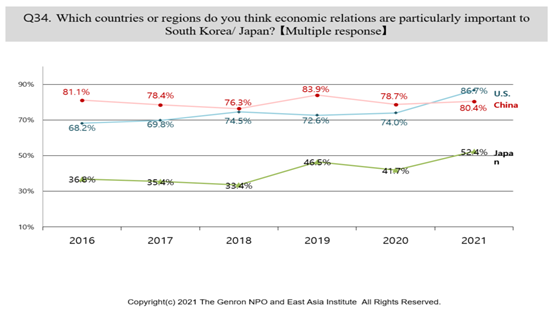
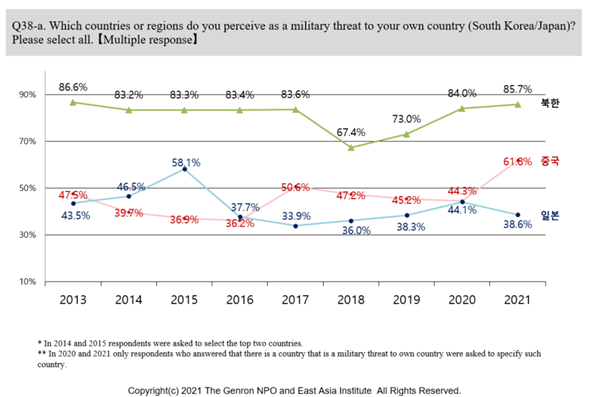
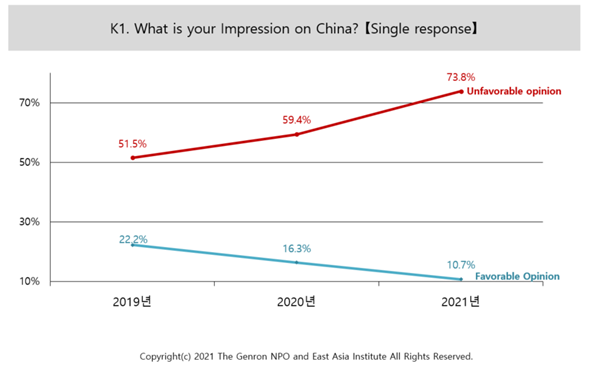
The aforementioned results suggest that for the Korean public, the future is linked to the China issue. Assuming that the biggest variable for the future security and prosperity of Korea is the U.S-China strategic competition, China’s challenge and the surge in threat perception and dislike for China becomes the main driver of Korea’s perception of foreign relations. In this context, the increase in favorable perceptions of the U.S. and Japan contrasts with the increase in perceived threat and hostility towards China.
The tendency of the Korean public to view ROK-Japan relations as part of the U.S.-ROK-Japan cooperation to keep China in check amid the U.S.-China competition can be seen in Figure 8. This graph displays the answers to the question “why the ROK-Japan relationship is important.” “Because we are important trading partners (79.7%)” and “because we are neighboring countries (62.4%) are followed by “because ROK-Japan cooperation is mutually beneficial amidst the U.S.-China tension,” which increased by 11.2%p compared to the previous year. “Because we share common security interests as allies of the U.S.” and “because we share common values like democracy” increased by 9.6% and 8.1%p respectively compared to the previous year.
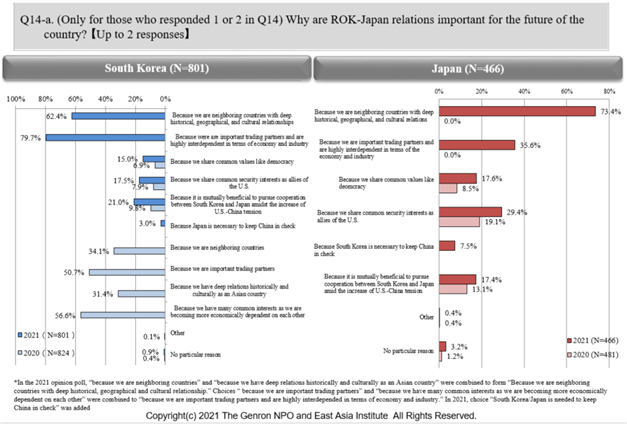
Upon examining the trend in public opinion of specific issues as shown in Figure 9, the public opinion that Korea, the U.S., and Japan should strengthen trilateral military-security cooperation increased from 53.6% in 2020 to 64.2% in 2021. The number of respondents that answered “neither” decreased from 35.4% to 27.5%. Furthermore, 40% of respondents answered that they believe China’s rise should be kept in check (Figure 10). Regarding South Korea’s participation in the Quad, Figure 11 shows that 51.1% are for and 18.1% are against participation. Considering that the Quad is a new cooperative platform led by the U.S. and Japan to balance China, the favorable public opinion toward Quad reflects the China threat sentiment. In addition, in Figure 12, when asked what response should be taken regarding the suppression of human rights in China, 51% of respondents say that they should participate in the tough response led by the U.S. and other countries. It can be said that the China balancing sentiment rather than a deep interest in protecting international human rights, played a bigger role in this response.
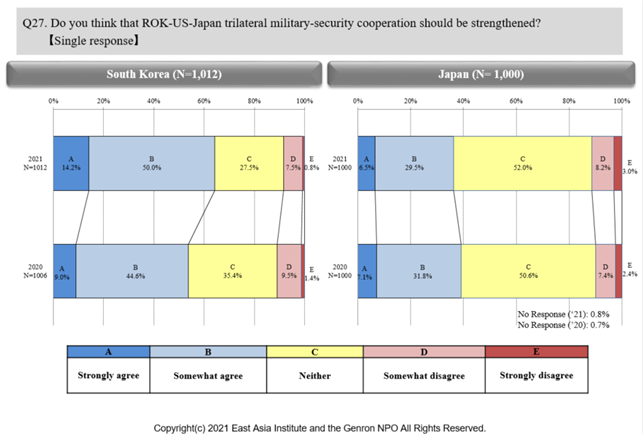
In conclusion, uncertainty over the future due to the U.S-China strategic competition and the China challenge is expressed through the increased support for international responses such as military security cooperation between South Korea, Japan, and the U.S., Quad membership, Korea-Japan economic cooperation, and international solidarity on human rights issues. All of the aforementioned cases require Korea-Japan cooperation.
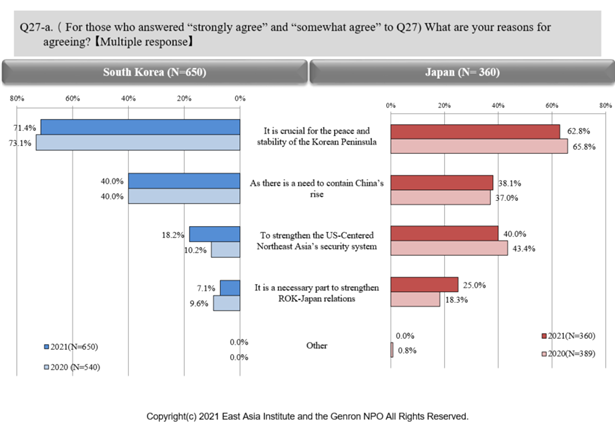
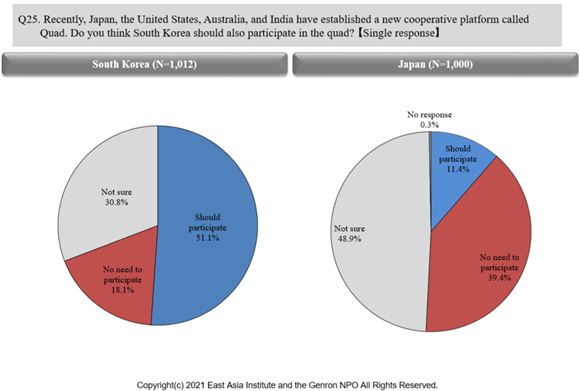
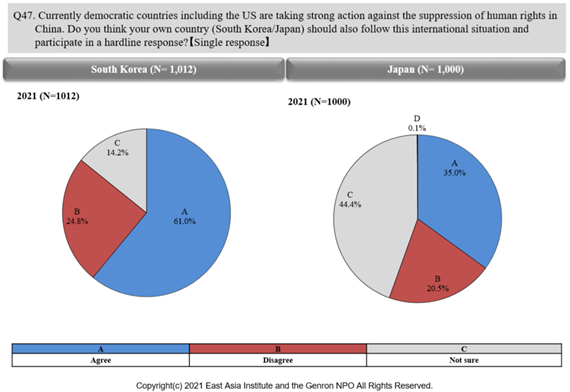
3. How to deal with the Divergence in Public Opinion between Japan and Korea
The Japanese public opinion also reflects U.S.-China tension and the Chinese threat. Perception of China as a military threat increased by 7.1%p compared to the previous year to 70.5% which was close to North Korea (76.5%) (Figure 6). Japanese public opinion also supported the restoration of ROK-Japan relations (Figure 13). Just as the support rose by 9.9% compared to the previous year in Korea, Japan also noticed an increase of 7.9%. While 71.1% of Koreans supported the strengthening of relations, only 46.7% of Japanese showed support, however. The Japanese public does not have high expectations for future-oriented cooperation with Korea and instead place focus on the settlement of the ongoing historical disputes. There is a tendency to converge on Korea’s past principal position (“future-oriented cooperation will be difficult without solving historical disputes”) (Figure 3). Therefore, the response regarding the strengthening of ROK-U.S.-Japan military security cooperation is lukewarm. The response to neither agree nor disagree to the trilateral security alliance only slightly increased from 50.6% in 2020 to 52% in 2021. The total amount of respondents that agreed decreased from 38.9% in 2020 to 36% in 2021 (Figure 9). Japan showed a negative response to Korea’s participation in the Quad (only 11.4% were in favor) and only 21.8% of respondents believed viewed Korea as an important economic partner despite Korea being Japan’s third-largest trading partner. The need for ROK-Japan economic cooperation also slightly decreased from 47.1% to 44% (Figure 14).
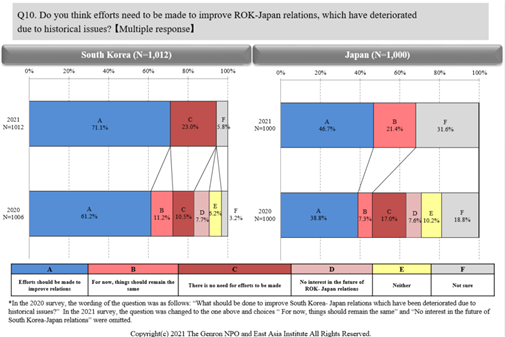
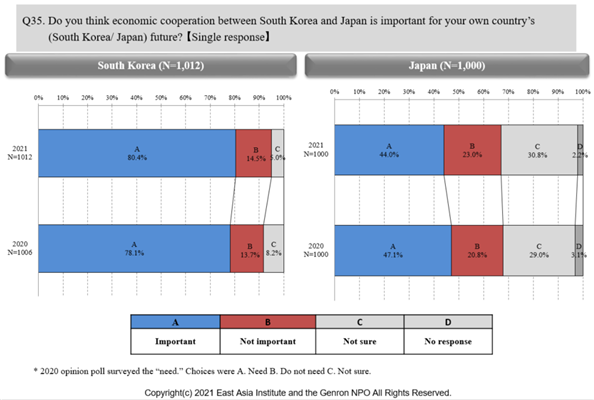
There are two possible explanations as to the lukewarm response of Japan about improving ROK-Japan relations. First, in order to meet the China challenge, Japan maintains existing diplomatic initiatives such as the Quad, FOIP, and CPTPP while the Korean public expresses renewed interest in restoring the ROK-U.S.-Japan trilateral cooperation and ROK-Japan cooperation. As Korea is not a member of any of these initiatives, there is little incentive for Tokyo to restore bilateral cooperation. And the public most likely follows this position. Second, the primary attention of the Japanese public has focused on elements that can influence ROK-Japan relations such as the pending history issues (the wartime forced labor and the comfort women issues). In other words, unless the Korean government offers a reasonable solution to the historical dispute, it will be difficult for them to show genuine interest in improving bilateral relations.
Korea-Japan relations have entered a new stage in face of the new international environment brought on by the forces of the U.S.-China strategic competition and the China challenge. Under the new Biden administration, the U.S. has emphasized security cooperation between South Korea, the U.S., and Japan in order to respond to a rising China and strongly called on Korea and Japan to improve relations, emphasizing that historical issues should not undermine the core strategic interests for the region. It is the Korean public who accurately recognizes this situation and supports this idea. They propose a future that differs from the “future’s past” that previously dominated the ROK-Japan relations discourse. The ROK-Japan relations are to re-examine, keeping in mind the intensifying U.S.-china strategic cooperation, the China challenge, and global risks from the COVID-19 pandemic. There is a need for the Japanese public and the new administration to accurately understand the changes in the Korean public opinion and abandon its one-track approach that ties history issues to the rest of security and economic cooperation. The next Korean government should also promote and reconstruct ROK-Japan relations in a way that adapts to the accelerating changes by corresponding to the newly formed public opinion. ■
■ Yul Sohn is president of the East Asia Institute and professor at the Graduate School of International Studies (GSIS) and Underwood International College at Yonsei University. He served as president of the Korean Association of International Studies in 2019, dean of GSIS from 2012 to 2016, and president of the Association for Contemporary Japan in 2012. Before joining Yonsei University, Sohn taught at Chung-Ang University and was a visiting scholar at the University of Tokyo; Waseda University; University of North Carolina, Chapel Hill; and University of California, Berkeley. Sohn has served on several government advisory committees, including the South Korean Ministry of Foreign Affairs, the South Korean Ministry of Trade Korean National Diplomatic Academy, the Northeast Asian History Foundation, and the Korea Foundation. Sohn has written extensively on Japanese and East Asian political economics, East Asian regionalism, and global governance. His recent publications include Sohn received his Ph.D. in political science from the University of Chicago.
■ Typeset by Ha Eun Yoon Research Associate
For inquiries: 02 2277 1683 (ext. 208) | hyoon@eai.or.kr